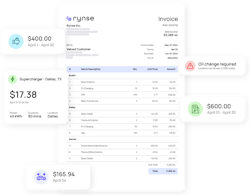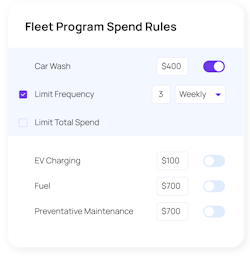What if a fuel card could be used for preventive maintenance? What about for car washes? A startup in fleet management software is bringing that capability to fleets.
The startup, Rynse, helps fleet managers make sense of all fleet-related transactions by providing and streamlining procurement, as well as consolidating all the billing related to fleet transactions. The company uses both a physical card product (a credit card) and a software product that tracks and simplifies billing management.
“We're providing fleet management solutions for government and enterprise organizations to handle all their auto care … everything but fuel,” Roland Lau, Rynse CEO, told FleetOwner. “We're just trying to simplify the workflows.”
Rynse is unlike a typical fleet management software solution, which integrates with payment providers to capture transaction details and then schedules maintenance, Lau said. Rynse is also unlike typical fleet payment solutions, “which are banking products, first, [and] focus on expense management,” he explained.
These typical solutions primarily work to extract fuel transactions made from partner merchants to identify transaction details, such as the price of fuel and the amount purchased, according to Lau.
Instead, Rynse delves into fleet-related transactions that extend well beyond fuel expenses.
The Rynse solution
There are many more fleet-related transactions beyond fuel purchases, which can require a significant amount of effort to keep track of. Lau explains it this way:
Traditionally, fleet managers—whether with a government agency or in the private sector—sit at a high level, such as at company headquarters. These fleet managers and decision-makers are responsible for multiple departments and, possibly, operate in different markets, which can span a state, region, or nationwide. When non-fuel fleet-related purchases must be made, such as a car wash, it’s up to the fleet manager to contact a vendor, set up contracts, and add them to the network.
Fleets that operate in multiple markets require multiple contracts within their network.
“As you can imagine, the more vendors you have on the network, the more cumbersome billing becomes at the end of the month,” Lau said, especially if an invoice must be chased down.
Rynse solves this problem with a software solution complemented with a card solution: Think fuel cards for preventive fleet maintenance.
Just as a fuel card can extract specific details and information from a fuel transaction, such as the date and location of the purchase, the total cost of the transaction, the type of fuel purchased, and even driver identification, Rynse’s solution can do the same for preventive maintenance transactions.
The Rynse card records details from the transaction and stores them where fleet managers can access them in the Rynse software solution or portal.
When working with a vendor, Lau said fleet managers aren’t likely to see their fleet’s transactions until the end of the month when the invoice is available. What’s more, each vendor sends their own invoice separately. Yet, with the Rynse solution, fleet managers can see each transaction as it happens in the Rynse software portal—and they can see each transaction from separate vendors all in one place. Fleets can also set spending limits on these cards based on each maintenance category.
The portal’s dashboard also gives fleet managers insights into where the bulk of their spending is taking place, whether that’s preventive maintenance, fuel, or even EV charging.
These fleet transactions are reflected in the Rynse portal when drivers use the Rynse credit card, which is backed by MasterCard.
“The card product is more of a recognition system,” Lau said. “We get that transaction, we're able to show it in our software, and we can expand the vendor network.”
What’s more, Rynse cards are accepted anywhere a MasterCard is accepted, allowing fleet drivers to make fleet-related transactions when and where they are, instead of driving out of their way to find a specific vendor.
See also: How your fleet can survive Roadcheck 2025
The Rynse network
A draw of the Rynse card is that it is accepted at all fleet vendors where MasterCard is accepted, negating the need for a Rynse-preferred network. However, a preferred network can have its benefits, and Rynse is working to provide that in addition to its non-network offering, helping customers unlock even more benefits, such as the potential to receive discounts and in-network pricing.
And those partnerships aren’t exclusive to national chains; Rynse is also focused on its customers’ local markets.
“We build national partnerships—that's one approach—with chains that may have a concentration in multiple markets,” such as large car wash and auto care chains, Lau said. But Rynse also does a “bottom-up approach, where we're building [a network] locally for clients that we have by looking where they visit. From there, we can leverage that same sort of local operator.”
Additionally, this preferred vendor network is built around Rynse customers. Lau said Rynse has already built local networks for up to 30 of its customers.
The Rynse revolution
Rynse began its business servicing government fleets and fleets with light-duty passenger vehicles, but Lau said the company is now expanding into commercial fleets of all shapes and sizes.
Lau said Rynse has proven to be a true business solution for fleet managers in the commercial segment, as they are “leaning on” Rynse to help them find service providers to perform on-site maintenance and truck washes instead of asking a driver spend time off the clock taking a large truck to a brick and mortar maintenance shop, Lau said.
Rynse helped government fleets solve this problem for their larger assets, and Lau said the company is ready to solve the problem for commercial fleets as well. And this goes for car washes, mobile and on-site maintenance, and even providing fleets with an electric vehicle charging network.
Rynse hasn’t been around very long—it began servicing government fleets only last year. But 2025 is a year of expansion for the company, as it has opened its services to the broader commercial fleet market beginning earlier this year.






